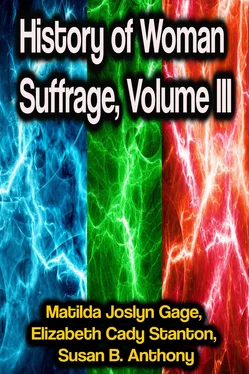With the close of the centennial year the new departure under the fourteenth amendment ended. Though defeated at the polls, in the courts, in the national celebration, in securing a plank in the platforms of the Republican and Democratic parties, and in our own conventions—so far as the few were able to rouse the many to simultaneous action—nevertheless a wide-spread agitation had been secured by the presentation of this phase of the question.
Although the unanswerable arguments of statesmen and lawyers in the halls of congress and the Supreme Court of the United States, had alike proved unavailing in establishing the civil and political rights of women on a national basis, their efforts had not been in vain. The trials had brought the question before a new order of minds, and secured able constitutional arguments which were reviewed in many law journals. The equally able congressional debates, reported verbatim, read by a large constituency in every State of the Union, did an educational work on the question of woman's enfranchisement that cannot be overestimated.
But when the final decision of the Supreme Court in the case of Virginia L. Minor made all agitation in that direction hopeless, the National Association returned to its former policy, demanding a sixteenth amendment. The women generally came to the conclusion that if in truth there was no protection for them in the original constitution nor the late amendments, the time had come for some clearly-defined recognition of their citizenship by a sixteenth amendment.
The following appeal and petition were extensively circulated:
To the Women of the United States:
Having celebrated our centennial birthday with a national jubilee, let us now dedicate the dawn of the second century to securing justice to women. For this purpose we ask you to circulate a petition to congress, just issued by the National Association, asking an amendment to the United States Constitution, that shall prohibit the several States from disfranchising citizens on account of sex. We have already sent this petition throughout the country for the signatures of those men and women who believe in the citizen's right to vote.
To see how large a petition each State rolls up, and to do the work as expeditiously as possible, it is necessary that some person in each county should take the matter in charge, urging upon all, thoroughness and haste. * * * The petitions should be returned before January 16, 17, 1877, when we shall hold our Eighth Annual Convention at the capital, and ask a hearing before congress.
Having petitioned our law-makers, State and national, for years, many from weariness have vowed to appeal no more; for our petitions, say they, by the tens of thousands, are piled up in the national archives, unheeded and ignored. Yet it is possible to roll up such a mammoth petition, borne into congress on the shoulders of stalwart men, that we can no longer be neglected or forgotten. Statesmen and politicians alike are conquered by majorities. We urge the women of this country to make now the same united effort for their own rights that they did for the slaves at the South when the thirteenth amendment was pending. Then a petition of over 300,000 was rolled up by the leaders of the suffrage movement, and presented in the Senate by the Hon. Charles Sumner. But the statesmen who welcomed woman's untiring efforts to secure the black man's freedom, frowned down the same demands when made for herself. Is not liberty as sweet to her as to him? Are not the political disabilities of sex as grievous as those of color? Is not a civil-rights bill that shall open to woman the college doors, the trades and professions—that shall secure her personal and property rights, as necessary for her protection as for that of the colored man? And yet the highest judicial authorities have decided that the spirit and letter of our national constitution are not broad enough to protect woman in her political rights; and for the redress of her wrongs they remand her to the State. If our Magna Charta of human rights can be thus narrowed by judicial interpretations in favor of class legislation, then must we demand an amendment that, in clear, unmistakable language, shall declare the equality of all citizens before the law.
Women are citizens, first of the United States, and second of the State wherein they reside; hence, if robbed by State authorities of any right founded in nature or secured by law, they have the same right to national protection against the State, as against the infringements of any foreign power. If the United States government can punish a woman for voting in one State, why has it not the same power to protect her in the exercise of that right in every State? The constitution declares it the duty of congress to guarantee to every State a republican form of government, to every citizen, equality of rights. This is not done in States where women, thoroughly qualified, are denied admission into colleges which their property is taxed to build and endow; where they are denied the right to practice law and are thus debarred from one of the most lucrative professions; where they are denied a voice in the government, and thus, while suffering all the ills that grow out of the giant evils of intemperance, prostitution, war, heavy taxation and political corruption, stand powerless to effect any reform. Prayers, tears, psalm-singing and expostulation are light in the balance compared with that power at the ballot-box that coins opinions into law. If women who are laboring for peace, temperance, social purity and the rights of labor, would take the speediest way to accomplish what they propose, let them demand the ballot in their own hands, that they may have a direct power in the government. Thus only can they improve the conditions of the outside world and purify the home. As political equality is the door to civil, religious and social liberty, here must our work begin.
Constituting, as we do, one-half the people, bearing the burdens of one-half the national debt, equally responsible with man for the education, religion and morals of the rising generation, let us with united voice send forth a protest against the present political status of woman, that shall echo and reëcho through the land. In view of the numbers and character of those making the demand, this should be the largest petition ever yet rolled up in the old world or the new; a petition that shall settle forever the popular objection that "women do not want to vote."
Elizabeth Cady Stanton, President.
Matilda Joslyn Gage, Chairman Executive Committee. Susan B. Anthony, Corresponding Secretary.
Tenafly, N. J. , November 10, 1876.
To the Senate and House of Representatives in Congress assembled:
The undersigned citizens of the United States, residents of the State of ——, earnestly pray your honorable bodies to adopt measures for so amending the constitution as to prohibit the several States from disfranchising United States citizens on account of sex.
In addition to the general petition asking for a sixteenth amendment, Matilda Joslyn Gage, this year (1877) sent an individual petition, similar in form to those offered by disfranchised male citizens, asking to be relieved from her political disabilities. This petition was presented by Hon. Elias W. Leavenworth, of the House of Representatives, member from the thirty-third New York congressional district. It read as follows:
To the Senate and House of Representatives of the United States in Congress assembled:
Matilda Joslyn Gage, a native born citizen of the United States, and of the State of New York, wherein she resides, most earnestly petitions your honorable body for the removal of her political disabilities and that she may be declared invested with full power to exercise her right of self government at the ballot-box, all State constitutions, or statute laws to the contrary notwithstanding.
Читать дальше












